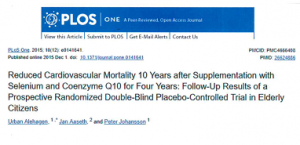
In a recent article on the web-site q10facts.com, I have posted a summary of an article in which researchers discuss the various ways in which statin medications may increase patients’ risk of atherosclerosis and heart failure. Yes, the Japanese and American researchers say, the statin medications do lower cholesterol levels [Okuyama].
But, the guidelines for the use of statin medications need to be re-examined. The researchers say: There has been a remarkable increase in the incidence of heart failure in the same period that statin medications have been used [Okuyama].
Furthermore, there are known mechanisms by which statin medications could be causing an increase in the incidence of atherosclerosis and heart failure.
- Statins inhibit the bio-synthesis of Coenzyme Q10.
- Statins inhibit the incorporation of selenium into antioxidant selenoproteins.
- Statins are associated with reduced levels of enzymatic antioxidants.
- Statins inhibit vitamin K synthesis.
Statins and the impaired development of selenoproteins
In an article in the Lancet, the German researchers Dr. Moosmann and Dr. Behr noted that the taking of statin medications is associated with some unusual side effects that have potentially severe consequences.
Specifically, the pattern of adverse side effects caused by the taking of statin medications resembles the pathology associated with selenium deficiency. For example, the pathology associated with the taking of statin medications resembles the pathology associated with the dilated cardiomyopathy (heart failure) observed in the selenium-poor region of the Keshan province in China [Moosmann & Behr].
Drs. Moosmann & Behr postulate that the negative effects of statins on selenoprotein formation explain many of the adverse side-effects of statins, e.g. statin-induced muscle pain and fatigue.
The statin-induced inhibition of selenoproteins such as the glutathione peroxidase antioxidant enzymes results in elevated levels of lipid peroxidation, which is associated with increased risk of atherosclerosis and heart failure. Higher glutathione peroxidase activity in the red blood cells is associated with reduced risk of coronary heart disease and with event-free survival for more than five years. Statin-induced reduction of glutathione peroxidase activity would not be a good thing [Moosmann & Behr].
Note: Several of the glutathione peroxidases function as antioxidant enzymes that neutralize damaging reactive oxygen species such as hydrogen peroxide and the lipid hydro-peroxides. Reduced synthesis of these antioxidant enzymes means more oxidative stress and oxidative damage.
Moreover, the taking of statin medications can result in reduced levels of the endogenous enzymatic antioxidants superoxide dismutase and catalase, putting the immune system further at risk [Moosmann & Behr].
Statins’ adverse effect on the mitochondria
The Polish researchers Drs. Broniarek and Jarmuszkiewicz have made the case that prolonged use of statin medications impairs mitochondrial function. The adverse effect of statin medications on the mitochondria is seen in the following ways:
- Abnormal shape of mitochondria
- Decreased generation of ATP energy
- Decreased potential (think: “voltage”) across mitochondrial membranes
- Activated mitochondrial apoptosis pathways (programmed cell death)
In agreement with the Japanese and American researchers [Okuyama] and the German researchers [Moosmann & Behr], Dr. Broniarek and Dr. Jarmuszkiewicz propose that one of the plausible causes of the statin-induced mitochondrial dysfunction is the inhibited synthesis of selenoproteins.
Note: It is not an exaggeration to say that the mitochondria, the small bean-shaped organelles inside the cells, play a life-or-death role in human cells. Simply put, the mitochondria convert the energy in food to the ATP chemical energy that is needed for a wide range of cellular biological processes. Accordingly, the organs with the highest energy needs, e.g. the heart, the kidney, and the liver, have correspondingly more mitochondria. Malfunctioning mitochondria are thought to be a factor in the development of neuro-degenerative diseases, heart disease, cancer, and diabetes.
Summary: Statins and selenoproteins
The Japanese and American researchers have presented evidence of pharmacological mechanisms and evidence from clinical trials that indicates that the use of statin medications are “are not only ineffective in preventing coronary heart disease events but instead are capable of increasing coronary heart disease and heart failure” [Okuyama]. To repeat, among the mechanisms they list are the following:
- Suppression of selenoprotein synthesis
- Suppression of vitamin K synthesis
- Inhibition of Coenzyme Q10 and heme A bio-synthesis
The importance of adequate synthesis of selenoproteins is underscored by the KiSel-10 study data in which a daily combination of high-selenium yeast and Coenzyme Q10 supplements had significant health benefits for elderly citizens aged 70 – 80 at the start of the study [Alehagen]:
- reduced risk of death from heart disease
- reduced age-related decline heart function
- reduced levels of a bio-marker for the risk of heart failure
Sources
Alehagen, U., Johansson, P., Björnstedt, M., Rosén, A., & Dahlström, U. (2013). Cardiovascular mortality and N-terminal-proBNP reduced after combined selenium and coenzyme Q10 supplementation: a 5-year prospective randomized double-blind placebo-controlled trial among elderly Swedish citizens. International Journal of Cardiology, 167(5), 1860-1866.
Broniarek, I., & Jarmuszkiewicz, W. (2016). [Statins and mitochondria]. Postepy Biochemii, 62(2), 77-84.
Moosmann, B., & Behl, C. (2004). Selenoprotein synthesis and side-effects of statins. Lancet (London, England), 363(9412), 892-894.
Okuyama, H., Langsjoen, P. H., Hamazaki, T., Ogushi, Y., Hama, R., Kobayashi, T., & Uchino, H. (2015). Statins stimulate atherosclerosis and heart failure: pharmacological mechanisms. Expert Review of Clinical Pharmacology, 8(2), 189-199. doi:10.1586/17512433.2015.1011125
Disclaimer: The information presented in this review article is not intended as medical advice and should not be used as such.

Excellent article! I am a physicians and on statins. I am taking 2 Brazil nuts a day but have not been taking Co-Q10 which I have at home. My question is, should I take that also.
Dear Dr. Ebenezer,
There does seem to be a special interrelationship between the two substances, selenium and Coenzyme Q10.
Insufficient supply of selenium can inhibit the cells from getting optimal concentrations of Coenzyme Q10, and adequate concentrations of Coenzyme Q10 are needed for the cells to benefit from optimal selenoprotein function.
See, for example, Professor Urban Alehagen’s article on this subject.
Thank you,
Richard